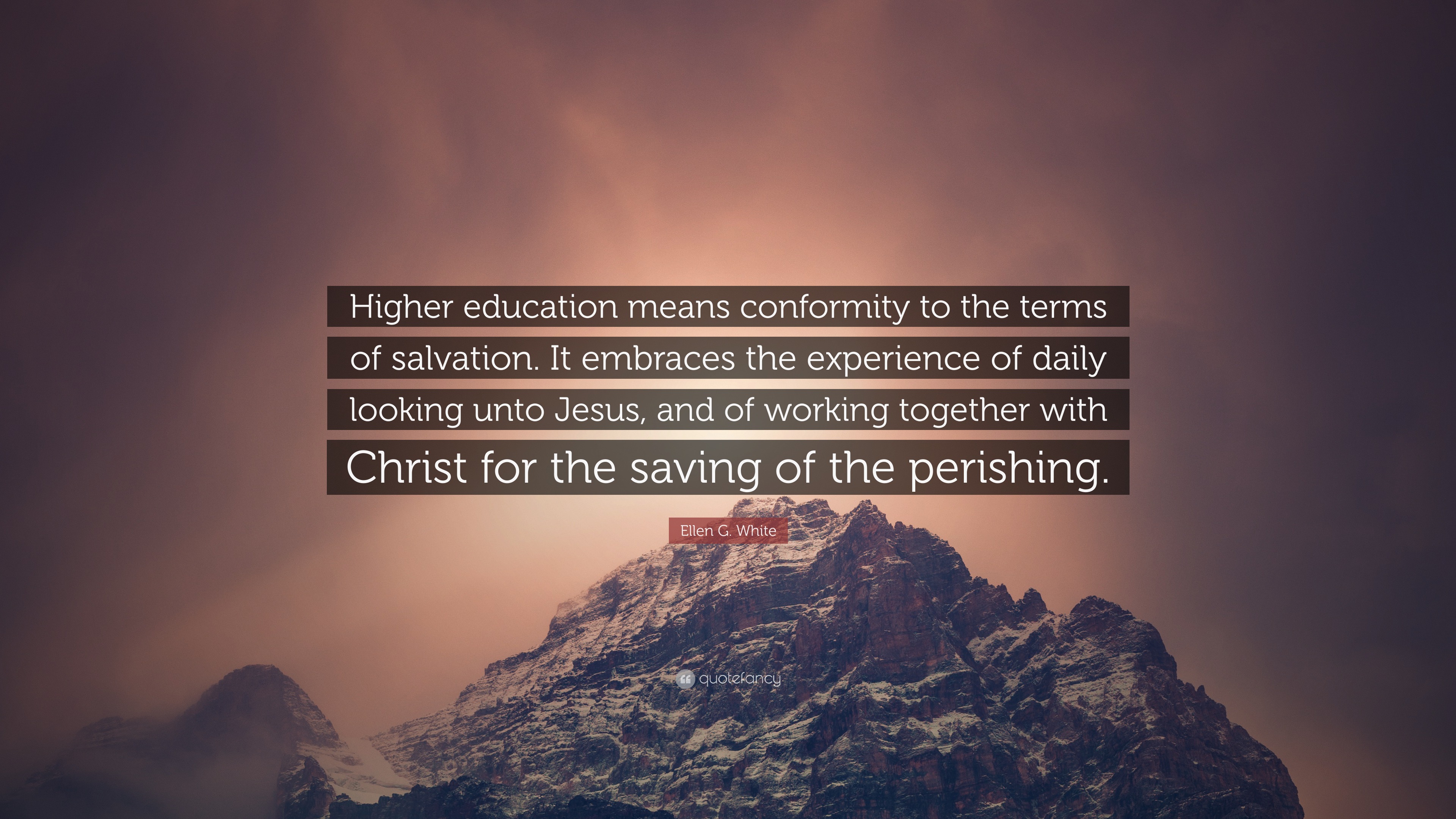Ellen G. White on education: A Comprehensive Overview
Ellen G. White, a prolific author and co-founder of the Seventh-day Adventist Church, held strong convictions about the importance and nature of true education. Her writings on the subject, spanning decades of her ministry, offer a comprehensive philosophy that extends beyond the mere acquisition of knowledge to encompass the development of the whole person – physical, mental, spiritual, and social. She emphasized the harmonious development of all faculties, the cultivation of character, and the preparation for service in this life and the life to come. This article explores the key themes in her educational writings, highlighting her vision for a holistic and God-centered approach to learning.
The Importance of True Education
White repeatedly stressed the distinction between “education” and “true education.” She viewed traditional education, focused primarily on intellectual development and worldly success, as incomplete and often misguided. True education, according to White, is a “harmonious development of the physical, the mental, and the spiritual powers.” It is a lifelong process that begins in the home and continues throughout one’s life.
Education as Redemption

A central theme in White’s educational philosophy is the concept of education as redemption. She believed that education should be a means of restoring the image of God in humanity, which was marred by sin. This involves not only intellectual development but also the cultivation of moral character and the development of a Christ-like spirit. True education, therefore, is intimately connected with spiritual growth and the preparation for eternity.
The Bible as the Foundation of Education
White advocated for the Bible to be the central textbook in all educational endeavors. She believed that the Scriptures contain the highest wisdom and provide the foundation for true knowledge. Studying the Bible, she argued, not only imparts spiritual truths but also develops critical thinking skills, strengthens the mind, and cultivates moral discernment.
The Development of the Whole Person
White emphasized the importance of developing all aspects of the individual – physical, mental, spiritual, and social. She believed that a balanced education should address each of these areas, promoting physical health, mental acuity, spiritual growth, and social responsibility.
Physical Development
White stressed the importance of physical health and proper care of the body. She advocated for fresh air, sunshine, exercise, and a healthy diet. She believed that physical health is essential for optimal mental and spiritual functioning.
Mental Development

White encouraged the development of mental faculties through the study of various disciplines, including science, history, and literature. However, she cautioned against the pursuit of knowledge for its own sake, emphasizing the importance of using knowledge for the glory of God and the service of humanity.
Spiritual Development
Spiritual development was paramount in White’s educational philosophy. She believed that true education should lead individuals to a deeper understanding of God and a personal relationship with Jesus Christ. She encouraged prayer, Bible study, and participation in religious activities as essential components of spiritual growth.
Social Development
White emphasized the importance of developing social skills and a sense of social responsibility. She encouraged students to be kind, compassionate, and helpful to others. She believed that true education should prepare individuals to be active and contributing members of society.
The Role of the Teacher
White placed a high value on the role of the teacher. She believed that teachers should be more than just instructors; they should be mentors and role models for their students. She emphasized the importance of teachers possessing strong moral character, a love for children, and a commitment to the principles of true education.
The Importance of the Home
White recognized the home as the primary educational institution. She believed that parents are the first and most important teachers of their children. She encouraged parents to create a loving and supportive home environment where children can develop physically, mentally, spiritually, and socially.
The Importance of Practical Training
White advocated for the integration of practical training into the educational curriculum. She believed that students should learn useful skills that would enable them to support themselves and contribute to society. She encouraged the development of vocational skills alongside academic learning.
Education for Service
White believed that the ultimate goal of education is to prepare individuals for service. She encouraged students to use their talents and abilities to serve God and their fellow human beings. She emphasized the importance of developing a spirit of selflessness and a desire to make a positive impact on the world.
The Dangers of Worldly Education
White cautioned against the dangers of worldly education, which she believed often emphasized intellectual development at the expense of moral and spiritual growth. She warned against the influence of secular philosophies and the pursuit of worldly success.
Education and Character Development
White saw a close connection between education and character development. She believed that true education should not only impart knowledge but also cultivate strong moral character. She emphasized the importance of developing honesty, integrity, kindness, and compassion.
The Importance of Self-Discipline
White believed that self-discipline is essential for both intellectual and spiritual growth. She encouraged students to develop habits of self-control, perseverance, and diligence.
The Value of Nature
White recognized the value of nature as a learning environment. She encouraged students to spend time outdoors, observing the natural world and learning from God’s creation.
The Importance of Health Reform
White’s emphasis on health reform was closely connected to her educational philosophy. She believed that a healthy lifestyle is essential for optimal physical, mental, and spiritual functioning. She encouraged students to adopt healthy habits of diet, exercise, and rest.
The Importance of Music
White recognized the power of music to influence the mind and heart. She encouraged the use of uplifting and inspiring music in the educational setting.
Education and the Sabbath
White saw the Sabbath as an integral part of a balanced education. She believed that the Sabbath provides an opportunity for spiritual renewal, reflection, and fellowship.
The Importance of Christian Schools
White advocated for the establishment of Christian schools where students could receive an education that integrated faith and learning. She believed that Christian schools could provide a safe and nurturing environment where students could develop physically, mentally, spiritually, and socially.
The Future of Education
White’s writings on education offer a timeless and relevant vision for the future. Her emphasis on the development of the whole person, the integration of faith and learning, and the preparation for service remains as important today as it was during her lifetime. Her call for a God-centered approach to education continues to inspire educators and parents around the world.
This overview of Ellen G. White’s writings on education provides a glimpse into her comprehensive and inspiring vision. Her emphasis on the harmonious development of all faculties, the cultivation of character, and the preparation for service offers a valuable framework for educators, parents, and students alike. By embracing the principles of true education, we can strive to create a world where individuals are equipped to live fulfilling lives and contribute to the betterment of society.
ellen white on education
